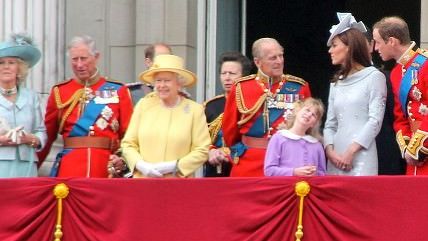The Benefits of Monarchy
King George VII will be better at limiting political power than any future American president.

Earlier this week a future king of the United Kingdom and other Commonwealth Realms was born. It is a strange feeling being the citizen of a country and being able to see a photo of your country's future head of state as an infant. However, when one reflects on the influence of the British monarchy on politics, the sight of a future king is no more depressing than the sight of upcoming 2016 candidates.
The idea of monarchy is understandably abhorrent to many Americans. The policies of King George III of the House of Hanover were the source of the complaints outlined in the Declaration of Independence, and his intransigence led to the Revolutionary War. But it's also true that a constitutional monarchy can provide a better check on political power than constitutional democracy. Before you accuse me of being anti-American, old fashioned, or some sort of red coat interloper, let me explain.
After winning the Revolutionary War the Founding Fathers created a system of government based on the principles of limited government. Their best intentions aside, the U.S. is no better than the despot against which it fought when it comes to inherited power, nepotism, abuse of political power, or extravagant tradition.
While it might initially seem that the men and women who sit in the House of Commons and the House of Lords act as a check on the powers of the British monarchy the reality is that the British monarch actually provides more of a check on the U.K's elected and unelected legislators. In the last hundred years many European nations have experienced fascism, communism, and military dictatorships. However, countries with constitutional monarchies have managed for the most part to avoid extreme politics in part because monarchies provide a check on the wills of populist politicians. European monarchies--such as the Danish, Belgian, Swedish, Dutch, Norwegian, and British--have ruled over countries that are among the most stable, prosperous, and free in the world. Constitutional monarchs make it difficult for dramatic political changes to occur, oftentimes by representing traditions and customs that politicians cannot replace and few citizens would like to see overthrown.
Something else that can be said in favor of a constitutional monarchy is that it allows for the head of the state to not be a political figure. Whether Democrat or Republican, the American president represents the country as the head of state, meaning that regrettably American culture, traditions, or interests are never represented by anyone other than a politician. British interests have been represented for decades by the same person who embodies the non-political customs and traditions of the U.K. In the U.S., every four years America could be represented by someone who has a different sense of what it means to be an American than whoever previously lived in the White House.
While the U.S. might not be a monarchy its political culture has a level of nepotism that puts the British monarchy to shame. The Bushes, Kennedys, and Clintons have all exploited family connections for personal and political gain and have established themselves as de-facto aristocracy in the United States. These American aristocrats have much in common with the British Royal family, especially given that while perhaps not the richest people in the country they certainly don't mind building on a family brand complete with mansions, eccentricity, fame, and mythology. If you are worried about the unfairness of heredity privilege it is hard to see how a constitutional republic is preferable to a constitutional monarchy.
Although not granted their position in virtue of their birth, American presidents enjoy some lifestyle perks that are similar, if not superior, to the perks the British royal family enjoys. The White House is a mansion that resembles a palace, yet the British prime minister, the most powerful politician in the U.K. and the American president's counterpart, gets to live in the comparatively modest 10 Downing Street, an attached office and living area that does not have the absurd amenities that the president enjoys in the White House, such as a bowling alley, swimming pool, tennis court, and cinema. Neither the Queen nor her prime minister get a security detail anywhere near as large as the American Secret Service.
Whatever the arguments might be against inherited power, it seems that in the absence of a monarchy Americans have managed to develop and foster a sort of American royalty. Oftentimes it seems that the only difference between the heads of state in the U.S. and the U.K. is that the regal handing over of power is scheduled in the U.S., unlike in the U.K. where the death or the abdication of the monarch marks a handover of power.
I admit that I don't like many things about the British monarchy, an institution I absolved all allegiance to when I became an American citizen. The pomp and circumstance is irritating, and the seemingly blind observance of tradition many British royalists demonstrate is at times disturbingly cultish. In fact, I would not count myself as a royalist, and would support the U.K. undergoing some rather significant constitutional reforms that would change the role of the head of state. Despite its flaws the fact remains that an unelected head of state provides a check on political power that keeps politicians comparatively humble, something America's founding documents, some of the most brilliant pieces of political theory in history, have not been able to achieve.
While it is understandable that the Founding Fathers would have wanted to avoid installing hereditary power into their new system of government, it seems modern Americans aren't exactly opposed to the idea. Would Madison and his colleagues have acted differently if given a glimpse of the awful regal spectacle that the American presidency would become?


Show Comments (122)